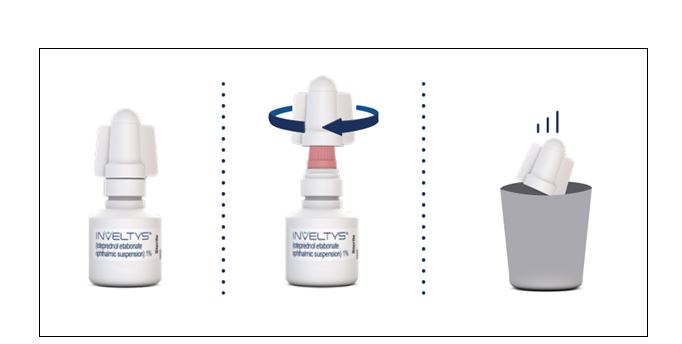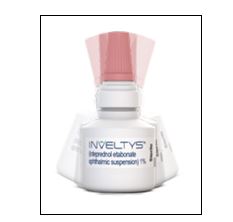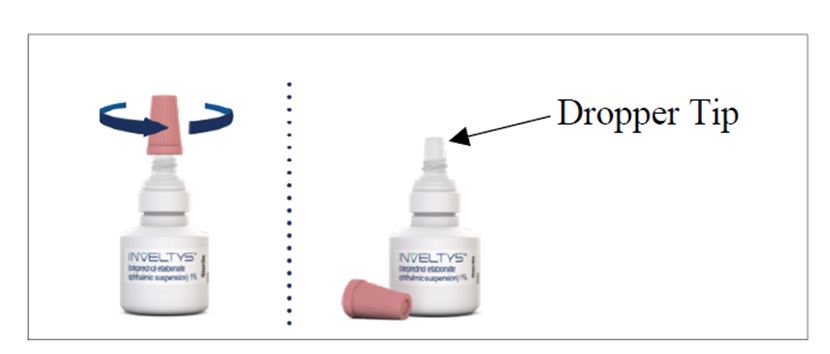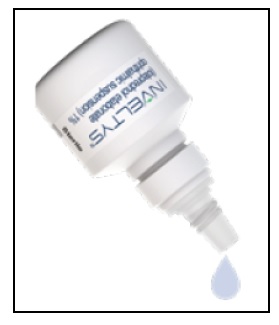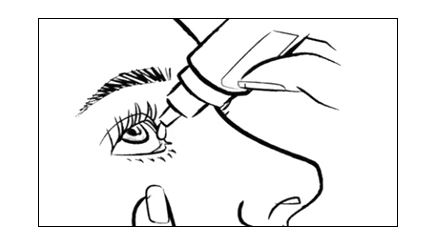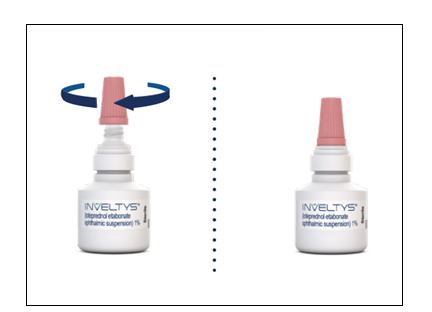Inveltys
These highlights do not include all the information needed to use INVELTYS safely and effectively. See full prescribing information for INVELTYS. INVELTYS (loteprednol etabonate ophthalmic suspension) 1%, for topical ophthalmic use Initial U.S. Approval: 1998
2ec16df8-2e5c-4e06-8d28-21df76f27d72
HUMAN PRESCRIPTION DRUG LABEL
Mar 27, 2024
ALCON LABORATORIES, INC.
DUNS: 008018525
Products 1
Detailed information about drug products covered under this FDA approval, including NDC codes, dosage forms, ingredients, and administration routes.
loteprednol etabonate
Product Details
FDA regulatory identification and product classification information
FDA Identifiers
Product Classification
Product Specifications
INGREDIENTS (7)
Drug Labeling Information
PACKAGE LABEL.PRINCIPAL DISPLAY PANEL
PRINCIPAL DISPLAY PANEL - 2.8 mL Bottle Carton
NDC 71571-121-28
Rx Only
INVELTYS®
(loteprednol etabonate ophthalmic suspension)1%
Sterile
2.8 mL
kala®
PHARMACEUTICALS
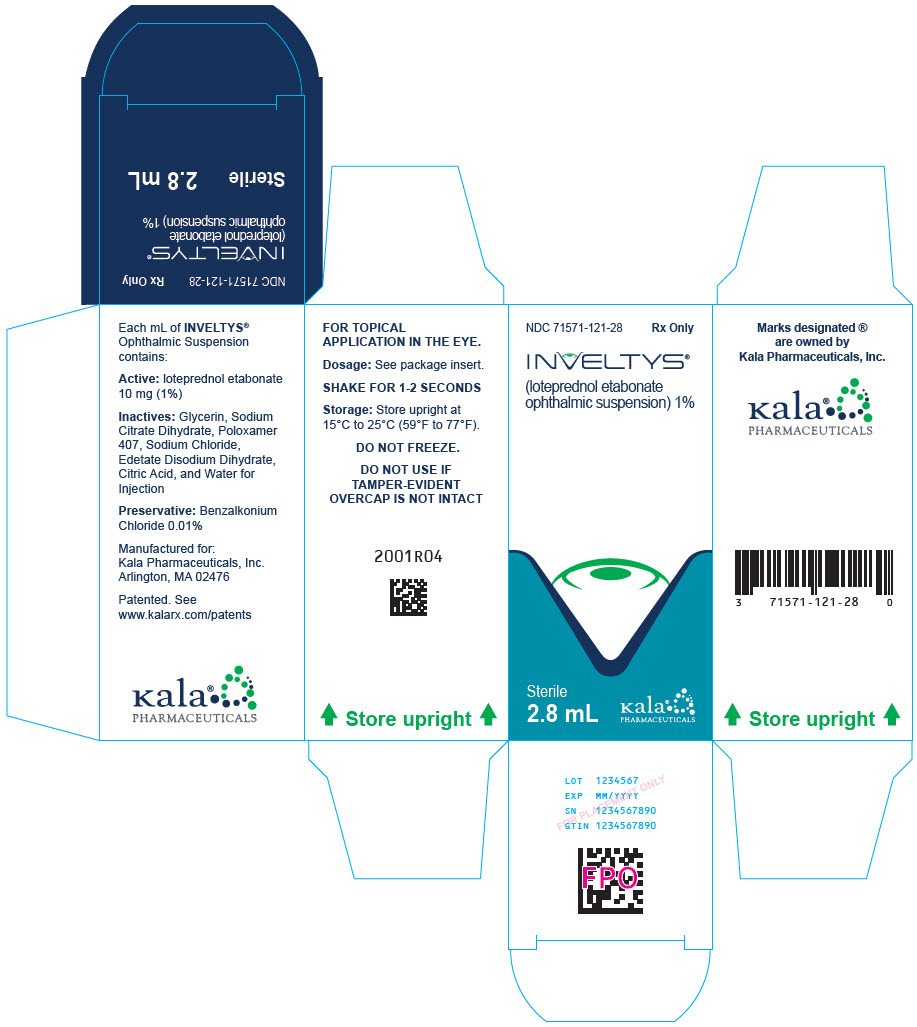
NDC 71571-121-28
Rx Only
INVELTYS®
(loteprednol etabonate
ophthalmic suspension) 1%
Sterile
2.8 mL
Alcon
FOR TOPICAL
APPLICATION IN THE EYE.
Dosage: See Prescribing
Information.
SHAKE FOR 1-2 SECONDS
Storage: Store upright at
15°C to 25°C (59°F to 77°F).
DO NOT FREEZE.
DO NOT USE IF
TAMPER-EVIDENT
OVERCAP IS NOT INTACT
300064651-1123
Store upright
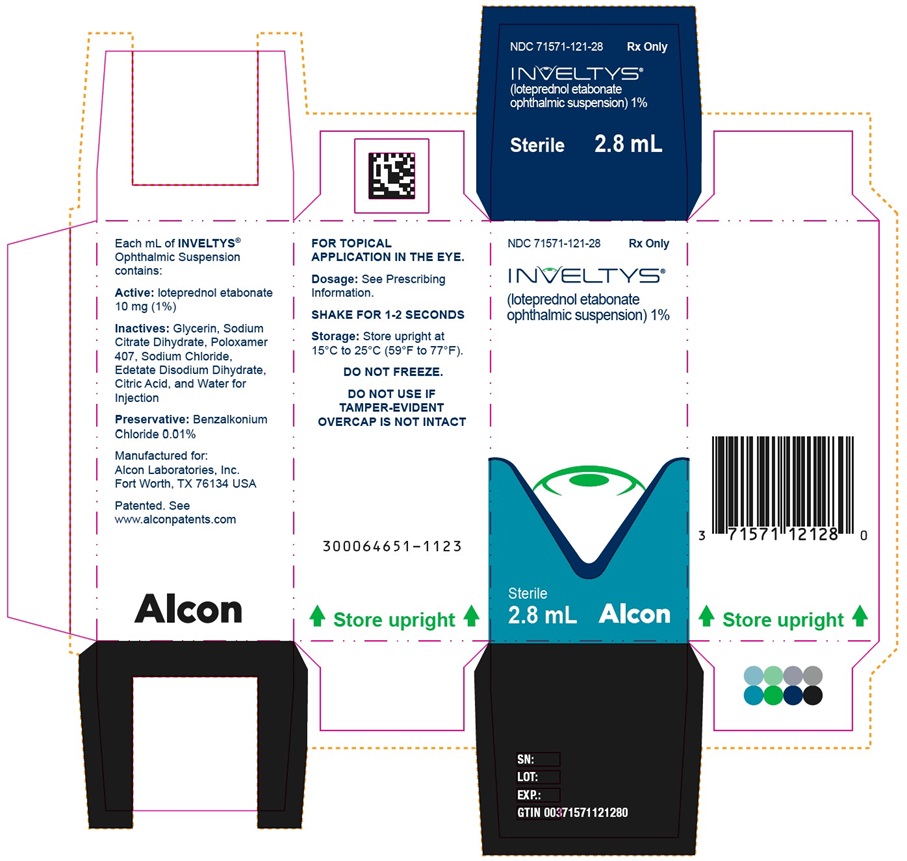
INVELTYS®
(loteprednol etabonate
ophthalmic suspension) 1%
Sterile
NDC 71571-121-28Rx Only
Alcon Laboratories, Inc.

INDICATIONS & USAGE SECTION
1 INDICATIONS AND USAGE
INVELTYS is a corticosteroid indicated for the treatment of post-operative inflammation and pain following ocular surgery.
INVELTYS is a corticosteroid indicated for the treatment of post-operative inflammation and pain following ocular surgery. (1)
CONTRAINDICATIONS SECTION
4 CONTRAINDICATIONS
INVELTYS is contraindicated in most viral diseases of the cornea and conjunctiva including epithelial herpes simplex keratitis (dendritic keratitis), vaccinia, and varicella, and also in mycobacterial infection of the eye and fungal diseases of ocular structures.
INVELTYS is contraindicated in most viral diseases of the cornea and conjunctiva including epithelial herpes simplex keratitis (dendritic keratitis), vaccinia, and varicella, and also in mycobacterial infection of the eye and fungal diseases of ocular structures. (4)
ADVERSE REACTIONS SECTION
6 ADVERSE REACTIONS
Adverse reactions associated with ophthalmic steroids include elevated intraocular pressure, which may be associated with infrequent optic nerve damage, visual acuity and field defects, posterior subcapsular cataract formation, delayed wound healing and secondary ocular infection from pathogens including herpes simplex, and perforation of the globe where there is thinning of the cornea or sclera.
6.1 Clinical Trials Experience
Because clinical trials are conducted under widely varying conditions, adverse reaction rates observed in the clinical trials of a drug cannot be directly compared to rates in the clinical trials of another drug and may not reflect the rates observed in practice.
The most common adverse drug reactions in the clinical trials with INVELTYS were eye pain and posterior capsular opacification, both reported in 1% of patients. These reactions may have been the consequence of the surgical procedure.
The most common adverse drug reactions were eye pain (1%) and posterior capsular opacification (1%). These reactions may have been the consequence of the surgical procedure. (6)
To report SUSPECTED ADVERSE REACTIONS, contact Alcon Laboratories, Inc. at 1-800-757-9195 or FDA at 1-800-FDA-1088 or www.fda.gov/medwatch.
DOSAGE & ADMINISTRATION SECTION
2 DOSAGE AND ADMINISTRATION
2.1 Dosage Information
Instill one to two drops ofINVELTYS into the affected eye twice daily beginning the day after surgery and continuing throughout the first 2 weeks of the post-operative period.
2.2 Administration Instructions
Instruct patient to wash hands well before each use.
Shake for one to two seconds before using.
If the patient is using other eye drops in addition toINVELTYS, advise the patient to wait at least 5 minutes between instillation ofINVELTYS and other eye drops.
- Shake for one to two seconds before using. (2)
- Instill one to two drops of INVELTYS into the affected eye twice daily beginning the day after surgery and continuing throughout the first 2 weeks of the post-operative period. (2)
DOSAGE FORMS & STRENGTHS SECTION
3 DOSAGE FORMS AND STRENGTHS
Ophthalmic suspension containing 10 mg/mL of loteprednol etabonate.
Ophthalmic suspension containing 10 mg/mL of loteprednol etabonate. (3)
DESCRIPTION SECTION
11 DESCRIPTION
Loteprednol etabonate is a corticosteroid. Its chemical name is chloromethyl 17α-[(ethoxycarbonyl)oxy]-11β-hydroxy-3-oxoandrosta-1,4-diene-17β-carboxylate. Its molecular formula is C24H31ClO7 and its chemical structure is:
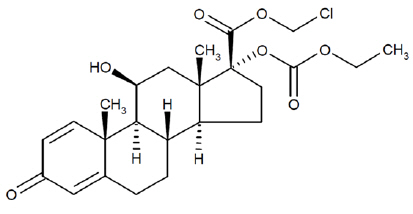
C24H31ClO7
Mol. Wt. 467.0
INVELTYS (loteprednol etabonate ophthalmic suspension) 1% contains a sterile, topical anti-inflammatory corticosteroid for ophthalmic use. Each mL contains:
- ACTIVE: loteprednol etabonate 10 mg (1%)
- INACTIVES: glycerin, sodium citrate dihydrate, Poloxamer 407, sodium chloride, edetate disodium dihydrate, citric acid, and water for injection
- PRESERVATIVE: benzalkonium chloride 0.01%
CLINICAL PHARMACOLOGY SECTION
12 CLINICAL PHARMACOLOGY
12.1 Mechanism of Action
Corticosteroids inhibit the inflammatory response to a variety of inciting agents and probably delay or slow healing. They inhibit the edema, fibrin deposition, capillary dilation, leukocyte migration, capillary proliferation, fibroblast proliferation, deposition of collagen, and scar formation associated with inflammation. While glucocorticoids are known to bind to and activate the glucocorticoid receptor, the molecular mechanisms involved in glucocorticoid/glucocorticoid receptor-dependent modulation of inflammation are not clearly established. However, corticosteroids are thought to inhibit prostaglandin production through several independent mechanisms.
12.3 Pharmacokinetics
Loteprednol etabonate is lipid soluble and can penetrate into cells. Loteprednol etabonate is synthesized through structural modifications of prednisolone-related compounds so that it will undergo a predictable transformation to an inactive metabolite. Based upon in vivo and in vitro preclinical metabolism studies, loteprednol etabonate undergoes extensive metabolism to inactive carboxylic acid metabolites, PJ-91 and PJ-90.
Following twice-daily unilateral topical ocular dosing ofINVELTYS for 14 days in healthy subjects, the plasma concentrations of loteprednol etabonate were below the limit of quantitation (1 ng/mL) at all timepoints.
CLINICAL STUDIES SECTION
14 CLINICAL STUDIES
Clinical efficacy was evaluated in 2 multi-centered, randomized, double- masked, placebo-controlled trials in which patients with an anterior cell grade greater than or equal to "2" (a cell count of 6 or higher using a slit- lamp biomicroscope) after cataract surgery were assigned toINVELTYS or placebo (vehicle) following surgery (NCT # 02163824 and NCT # 02793817). One to two drops ofINVELTYS or vehicle was self-administered twice a day for 14 days, beginning the day after surgery. Complete resolution of inflammation (a cell count of 0 maintained through day 15 without rescue medication) and complete resolution of pain (a patient-reported pain grade of 0 maintained through day 15 without rescue medication) was assessed 4, 8, and 15 days post- surgery. In the intent-to-treat analysis of both studies, a significant benefit was seen in theINVELTYS-treated group for complete resolution of ocular inflammation at Days 8 and 15, and complete resolution of pain at Days 4, 8, and 15, when compared with placebo. The consolidated clinical trial results are provided below.
Figure 1 Consolidated Clinical Trial Data: Percent of Patients with Complete Resolution of Anterior Chamber Cells (Cell Count = 0) at Days 8 and 15
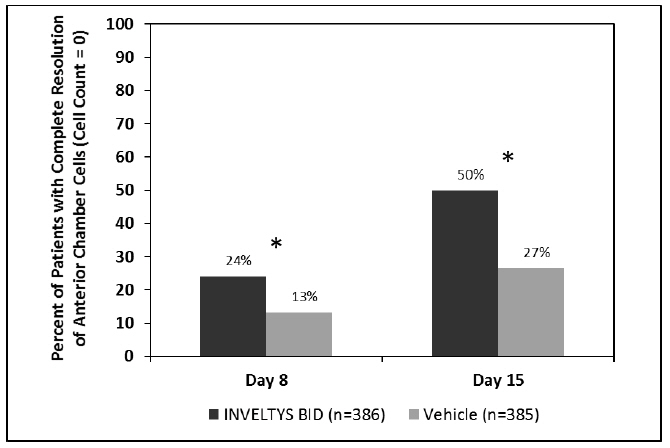
***** p-values < 0.01 for treatment comparisons
Figure 2 Consolidated Clinical Trial Data: Percent of Patients Who Were Pain Free at Days 4, 8, and 15
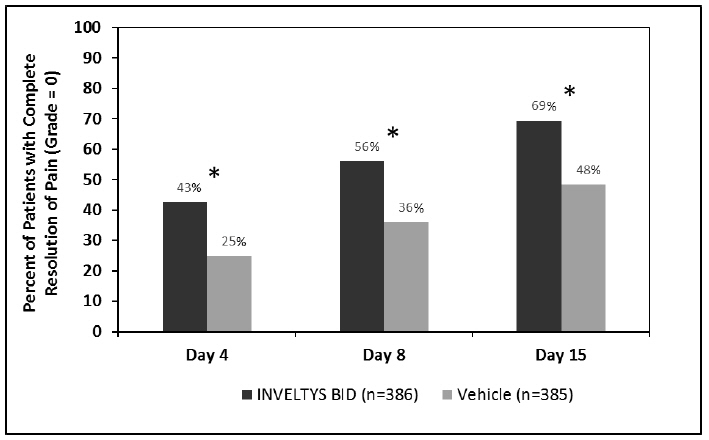
***** p-values < 0.01 for treatment comparisons
SPL UNCLASSIFIED SECTION
Manufactured for:
Alcon Laboratories, Inc.
Fort Worth, TX 76134 USA
U.S. Pat.: www.alconpatents.com
© 2023 Alcon Inc.
Alcon
INSTRUCTIONS FOR USE SECTION
|
INSTRUCTIONS FOR USE INVELTYS [in-vel-tis] (loteprednol etabonate ophthalmic suspension) 1% for topical ophthalmic use |
This Instructions for Use contains information on how to properly administer INVELTYS.
Important Information You Need to Know Before Using INVELTYS
- INVELTYS is for use in the eye only.
- Wash your hands before using INVELTYS. *Do not use if the tamper-evident seal is not intact. *Do not let the INVELTYS dropper tip touch your eye, fingers, or any other surfaces to avoid contamination or injury to your eye.
- Use INVELTYS exactly as your healthcare provider tells you to.
- If you are using INVELTYS with other eye (ophthalmic) medicines, you should wait at least 5 minutes between using INVELTYS and the other medicine.
- If you wear contact lenses, remove them before using INVELTYS.
- Put the pink cap back on INVELTYS after each use.
Before you use INVELTYS for the first time:
There are two caps on your bottle of INVELTYS. Hold the bottle firmly by its neck. Remove the white cap by twisting itclockwise (SeeFigure A). Throw away the white cap. INVELTYS is now ready to use.
|
Figure A |
Follow Steps 1 to 6 each time you use INVELTYS.
|
Step 1. |
Wash your hands well. |
|
Step 2. |
Shake the INVELTYS bottle for 1 to 2 seconds**(SeeFigure B)**. |
|
| |
|
Figure B | |
|
Step 3: |
Remove the pink cap from the top of the INVELTYS dropper by turning it counterclockwise (SeeFigure C). Keep the pink cap.Do not let the INVELTYS dropper tip touch your eye, fingers, or any other surface. |
|
| |
|
Figure C | |
|
Step 4: |
Turn the INVELTYS bottle upside down**(SeeFigure D)**. |
|
| |
|
Figure D | |
|
Step 5: |
Tilt your head back. Hold the bottle directly above your affected eye. Squeeze the middle of the INVELTYS bottle gently to put 1 to 2 drops (follow your doctor's recommendation) into the affected eye**(SeeFigure E)**. |
|
| |
|
Figure E | |
|
Step 6: |
Place the pink cap back onto the INVELTYS bottle and tighten by turning clockwise**(SeeFigure F)**. |
|
| |
|
Figure F |
If you use contact lenses, wait for 15 minutes before placing them back in.
How should I store INVELTYS?
- Store INVELTYS upright at 59ºF to 77ºF (15ºC to 25ºC). *Do not freeze.
Keep INVELTYS and all medicines out of the reach of children.
This Instructions for Use has been approved by the U.S. Food and Drug Administration.
Manufactured for:
Alcon Laboratories, Inc.
Fort Worth, TX 76134 USA
Revised: 11/2023
USE IN SPECIFIC POPULATIONS SECTION
8 USE IN SPECIFIC POPULATIONS
8.1 Pregnancy
Risk Summary
INVELTYS is not absorbed systemically following topical ophthalmic administration and maternal use is not expected to result in fetal exposure to the drug.
8.2 Lactation
Risk Summary
INVELTYS is not absorbed systemically by the mother following topical ophthalmic administration, and breastfeeding is not expected to result in exposure of the child toINVELTYS.
8.3 Pediatric Use
Safety and effectiveness in pediatric patients have not been established.
8.4 Geriatric Use
No overall differences in safety and effectiveness have been observed between elderly and younger patients.
NONCLINICAL TOXICOLOGY SECTION
13 NONCLINICAL TOXICOLOGY
13.1 Carcinogenesis, Mutagenesis, Impairment of Fertility
Long-term animal studies have not been conducted to evaluate the carcinogenic potential of loteprednol etabonate. Loteprednol etabonate was not genotoxic in vitro in the Ames test, the mouse lymphoma thymidine kinase (tk) assay, or in a chromosome aberration test in human lymphocytes, or in vivo in the single dose mouse micronucleus assay.
HOW SUPPLIED SECTION
16 HOW SUPPLIED/STORAGE AND HANDLING
INVELTYS (loteprednol etabonate ophthalmic suspension) 1% is a sterile ophthalmic suspension. It is supplied in a white low-density polyethylene plastic dropper bottle with a controlled-drop linear low-density polyethylene tip, a pink high-density polyethylene cap, and a white low-density polyethylene tamper-evident overcap in the following size:
2.8 mL in a 5 mL bottle (NDC 71571-121-28)
Storage and Handling
Do not use if tamper-evident overcap seal is not intact.
The white tamper-evident overcap can be thrown away. Retain the pink cap and keep the bottle tightly closed when not in use.
Store upright at 15°C to 25°C (59°F to 77°F). Do not freeze.
INFORMATION FOR PATIENTS SECTION
17 PATIENT COUNSELING INFORMATION
Administration
Instruct the patient to shake the bottle for one to two seconds before using. If the patient is using other eye drops in addition toINVELTYS, advise the patient to wait at least 5 minutes between instillation ofINVELTYS and other eye drops.
Risk of Contamination
Advise patients to wash their hands well before each use. Advise patients not to allow the dropper tip to touch any surface, as this may contaminate the suspension.
Risk of Secondary Infection
Advise the patient to consult a physician if pain develops, or redness, itching, or inflammation becomes aggravated.
Contact Lens Wear
Advise patients that the preservative inINVELTYS may be absorbed by soft contact lenses. Contact lenses should be removed prior to instillation of INVELTYS and may be reinserted after 15 minutes following administration.

